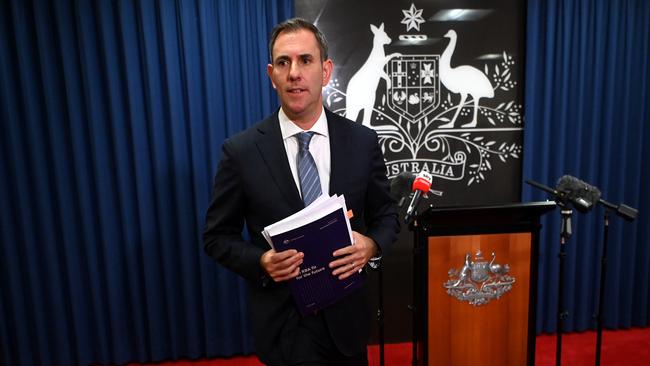
A fortnight to go before the budget and the pre-game chat is now at fever pitch: what will the Chalmers administration do?
Investors are braced for key changes such as higher taxes on the energy sector and new moves that might change conditions in the housing market.
On the other hand, they do not expect the government to change the program of legislated personal tax cuts that has been inherited from the Coalition.
In the days ahead we are going to get the seasonal flurry of hints, “drops” and rampant speculation we have come to expect at this time of the year.
But one thing is already clear: the die is cast on how this government can collect new revenue.
The way a new tax is planned for super has given the government a politically workable prototype that we may well see repeated in the months to come.
Every treasurer faces the same dilemma: deliver a budget where what you offer is given maximum airplay and what you take away is – ideally – regarded as irrelevant to the majority of the electorate.
In hitting super accounts with more than $3m, the government has found a layer of activity where few votes are lost and money can be raised.
In effect, the electorate has already signed off on this approach – 70 per cent of those under 50 approve the tax, says Newspoll.
But if the process is examined more closely, there is no way it would be accepted point blank.
Under the new proposal, funds with more than $3m will face an effective tax on earnings of 30 per cent.
Under some circumstances, if someone was awarded a large sum in an insurance disability payout, they would quickly find that their future income is heavily taxed. It’s not just the money they might make from investments down the track, but paper money gains – or unrealised gains – that would force them into the high tax band.
We know this because this week the submissions to the Treasury review on the new super tax were made available and we can now see a range of “unintended consequences”.
We also found out that as plans stand, property borrowing in super could also push investors into the higher super tax rate.
As the Self Managed Super Funds Association submission suggests: “A borrowing of itself does not increase the value of a SMSF.”
In relation to property loans in super, the SMSFA says: “With limited recourse borrowing arrangements, certain amounts in the total super balance need to be excluded.”
The Institute of Financial Professionals Australia submission suggests: “We believe all insurance proceeds should be excluded from a member’s TSB.”
The point here is that the government is not just moving to tax the wealthy – that is to be expected. Rather, in doing so it is creating the tax equivalent of bottom trawling: the target group of very wealthy investors will be trapped, but so will a variety of people who are not in the same league at all.
New taxes are difficult to get approved by the wider public, but the reality is that the 30 per cent tax (in practice a new 15 per cent tax on top of the existing 15 per cent tax that kicks in over $1.7m) has already passed in the court of public opinion.
What may happen in the budget is that Jim Chalmers offers some compromises on the new tax. It would be diplomatic to ensure insurance payouts are never liable under any circumstance.
In doing so, the government would look considerate – even graceful in victory. It’s a neat formula.
Another formula getting a workout goes like this: put an external group in the frame. Publicly suggest they are in an ideal spot to improve budget problems and see what comes to pass.
We saw this last year in the much hyped announcements that big super funds would enter the housing crisis and could fund a rush of developments.
The only problem is that the big super funds had no intention of agreeing to do this without a lot of concessions.
And the wider public did not like it all. Well, that’s according to none other than Industry Super Funds Australia, which has released a survey revealing that a majority of the electorate were worried about their savings being redirected by the government.
Ironically, some of the big industry funds are making serious moves to get involved in housing. Indeed, under the right conditions, big super should have a role.
Either way, don’t be surprised if next month’s budget presents another lunge at the housing issue. One idea being bandied about is that the national cabinet – where Canberra and state governments act together – gets involved in freeing up regulations to speed up housing supply.
In the meantime, it might be better to resort to a formula that works: accountancy group BDO suggests if the Treasurer really wants to get some funds, then capital gains tax might be on the agenda. A change here (while largely preserving the family home exemption) could fit the new formula very well.
BDO suggests: “It is possible to imagine a reduction in the CGT discount for gains over a certain threshold – say $3m – limiting the impact to a smaller, wealthier cohort.”
Well, Chalmers might well put that one in his little black book.



